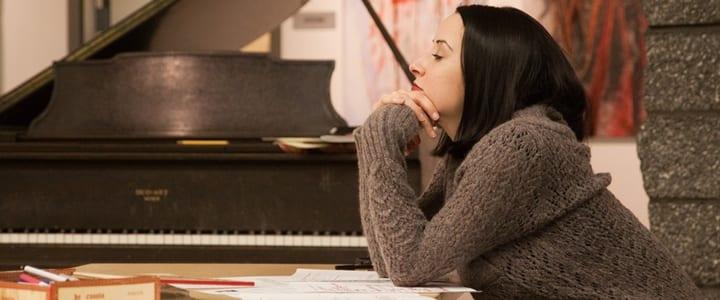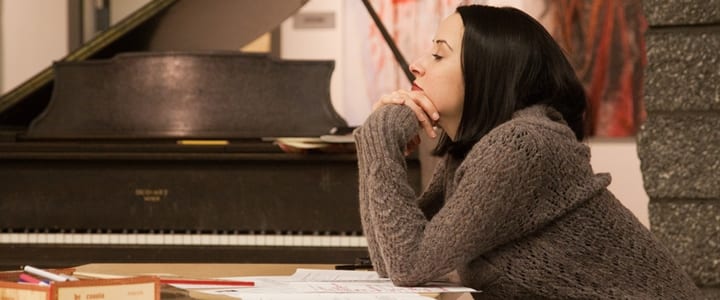So you’ve been preparing for an audition for a few months, and the big day has finally come. But even if you have the talent to back up your performance, there are a few things you’ll need to remember to get on your potential director’s good side. Read on as St. Augustine, FL teacher Heather L. explains…
Auditions can be the most unpleasant part of being a performing artist. But with great preparation and forethought, they can also be the most valuable and exciting part. Auditioning shows us clearly and quickly where our strengths and our challenges lie, and they can be opportunities for us to “put our face out there,” in other words, to showcase our talent within our communities and within the small world of the performing arts.
But talent alone rarely gets us the gigs that we seek. Here are four audition tips that go beyond bringing that talent of yours.
1. Arrive on time.
This might be most important of all of the audition tips. I’ve known performers who forgot sheet music or the words in their monologue to pass performance exams and get coveted roles, but I’ve never known a person to be late and to have a successful audition. First, it puts you, the auditioner, into a harried and stressed state. An acting teacher once taught me that a performer should come into the space in which he’s to perform 10 to 15 minutes beforehand. This allows you to get used to the feeling and energy of that space, to focus and to visualize an amazing audition. Secondly, it shows the director or audition team that you’re responsible, dependable and that you take the production seriously. They want to know that you’ll be at rehearsals and performances on time, too.
2. Be tremendously confident.
A vocal coach of mine once told me a personal story of hers to teach me a lesson about the importance of self-confidence. She flew from Virginia to New York to audition for the graduate program at the Manhattan School of Music. When she arrived at the college, she found that the administration hadn’t reserved a room for her in which to warm up, a standard accommodation at that level. The accomplished singer ended up singing vocalises in the women’s restroom. When she got to the stage to sing her prepared audition, she was so frustrated that she almost felt as though she didn’t care whether or not she got the spot in the illustrious school. She sang with such confidence and resolve that immediately upon ending the audition, the panel offered her a full scholarship on the spot. This timid and soft-spoken woman then told me, “You have to be almost cocky.” Please take note of the work “almost.” You own the stages on which you audition for the time that you’re given. Smile, then use that smile to show that you’re not only competent, but passionate about exactly what you’re doing.
3. Bring your listening ears.
So many otherwise great performing artists that I’ve known have had poor auditions because they just can’t seem to listen well to the judges or their crew, like the choreographer. You might assume that every audition and every dance is easy and every director is the same. Or you might not be able to stop talking and goofing off with the other performers. Either way, you won’t make a great impression, no matter how good or experienced you are. Instead, focus and be respectful. Being mostly quiet will also be an outstanding help to running an internal monologue and tapping into your emotions.
4. Be a team player.
This audition tip is meant to balance the aforementioned one about being tremendously confident. Make sure you are willing and open to almost anything. Believing in yourself and your gifts doesn’t mean being unwilling to perform small roles, for example, or singing something other than what you prepared, or reading cold with an actor that you don’t get along with. Performing arts auditions can be strange and spontaneous events. Successful, happy artists learn to go with the flow.
Every director and audition panel is different, but most tend to look for talented performers who are also responsible, focused, and radiantly confident. Stories abound in the opera world of young, beautiful divas found screaming at another performer backstage or showing up to auditions late or even plucking hairs out of director’s heads, then being given starring roles in the most opulent opera houses around the world. But those days are over. Production teams now want to work with people who are willing to work hard with others, those with a balance of humility and self-assuredness. With these audition tips, your best audition may be ahead of you.
 Heather L. teaches singing, piano, acting, and more in St. Augustine, FL, as well as through online lessons. She is a graduate of the prestigious Westminster Choir College in Princeton, New Jersey, and has performed with the New York and Royal Philharmonics, the New Jersey and Virginia Symphonies, the American Boy Choir, and the internationally renowned opera star Andrea Bocelli. Learn more about Heather here!
Heather L. teaches singing, piano, acting, and more in St. Augustine, FL, as well as through online lessons. She is a graduate of the prestigious Westminster Choir College in Princeton, New Jersey, and has performed with the New York and Royal Philharmonics, the New Jersey and Virginia Symphonies, the American Boy Choir, and the internationally renowned opera star Andrea Bocelli. Learn more about Heather here!
 Photo by Chris Blakeley
Photo by Chris Blakeley
Heather L.

